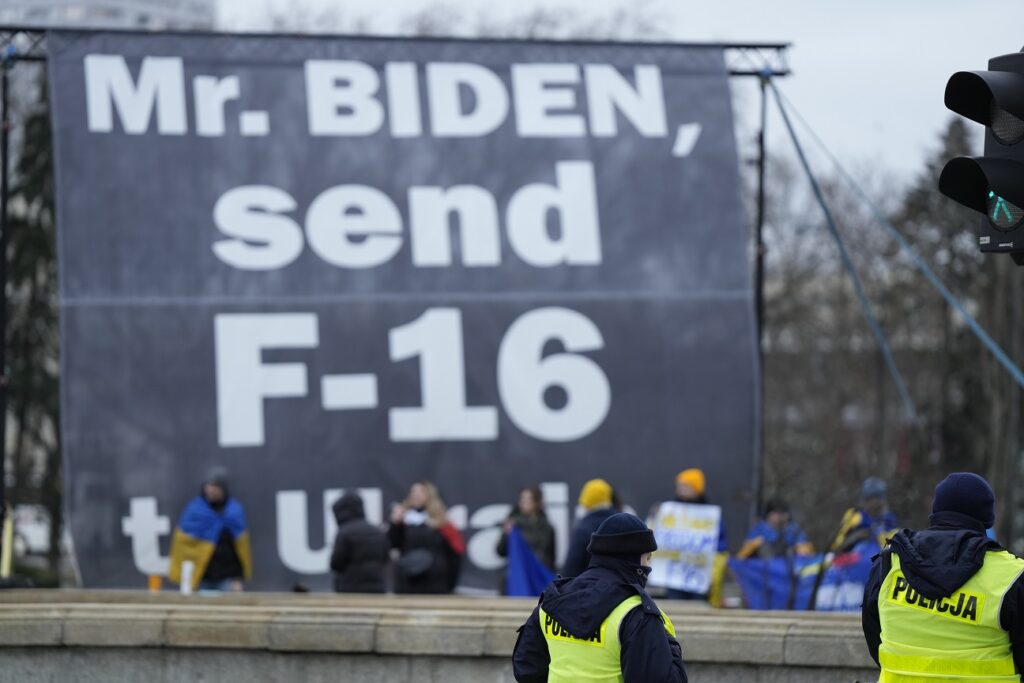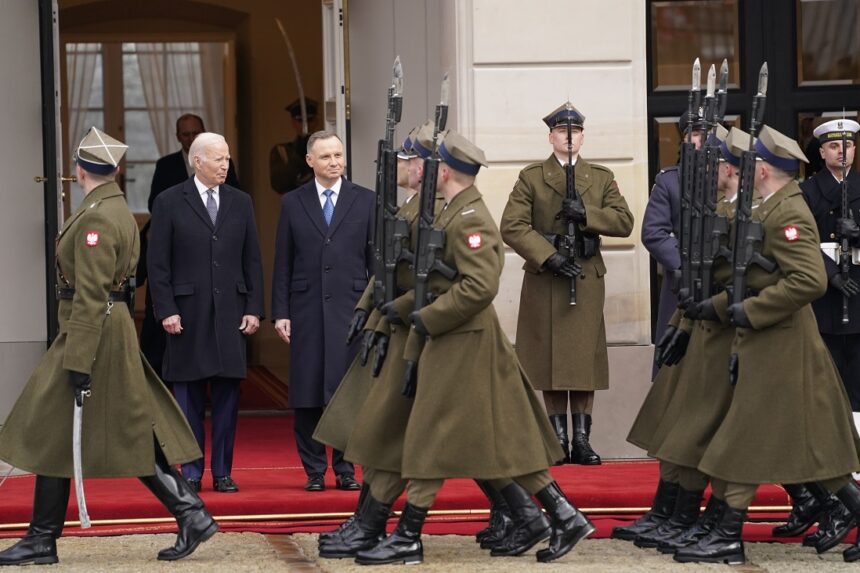A Letter from Poland
After a year of bloody conflict in Ukraine, some things remain certain while others have a very large question mark attached to them. Among the certainties is that Russia will win this war.
Taking into consideration all the available evidence and informed statements made not by armchair warriors or “analysts” financed by the arms industry, but by real military and intelligence professionals—such as Douglas Macgregor, Scott Ritter, Daniel L. Davis, Andrei Martyanov, and Jacques Baud—the Russians will win this war. In terms of logistics (as General Omar Bradley famously said, “Amateurs talk strategy. Professionals talk logistics.”)—economic resilience in the face of crisis, burn and replenishment rates, industrial capacity—Moscow has the advantage.
Thus, whatever one may think of Vladimir Putin’s decision to initiate war in Ukraine, and short of any major changes in the current trajectory of the conflict, as of this writing in mid-March, Russia is on the road to victory.
Among the uncertainties is the political trajectory of Poland. Recently, I interviewed Gordon Hahn, an independent Russian expert and analyst, who summed up Poland’s role since the start of hostilities in Ukraine as follows: “Poland acts like chief arsonist in the region.” Truer words could not have been spoken. Since the beginning of Russia’s invasion, Warsaw, leading the charge along with the Baltic states, has in essence become the Kiev regime’s most fervent spokesperson in NATO and the EU.
One gets the unmistakable impression that neoconservatives in Washington are especially proud of the Polish politicians outdoing themselves in their hysterical anti-Russian theatrics and ingratiating
subservience to Kiev. Count on Warsaw to push everything to the extreme and end up looking like the village idiot in the end.
Two examples immediately come to mind. The first is a recent photo posted on Facebook by the deputy marshal of the Sejm (the lower house of the Polish parliament), Małgorzata Gosiewska. The photo shows Gosiewska sitting in a tank during a visit to a training site. She added the caption, “On to Moscow!” The conservative commentator Łukasz Warzecha made the subsequent following comment: “She either has serious mental problems or is intellectually inept. In any case, such behavior is extremely irresponsible.”
In the kiss-up-to-Kiev department, it was reported recently that premier football club Śląsk Wrocław has been fined 15,000 zlotys (US$3,415) because its fans displayed a banner that read “This is not our war” during a match. “How dare they!” screamed the local warmongering media.
But this is just the tip of the iceberg in light of the massive financial fraud taking place under the guise of humanitarian support for Ukrainian “refugees.” After Feb. 24, 2022, Ukrainians fleeing to Poland were covered by a special law granting them special rights and privileges. These included the right to health care and to social assistance for 18 months. The latter provision meant granting Ukrainian citizens in Poland financial assistance equivalent to that previously only granted to taxpaying Polish families, as well as other cash payments. As the historian Przemysław Piasta has noted:
Handouts always arouse pathological attitudes. This has happened in this situation as well. The events in Przemyśl where Ukrainian organized gangs extorted Polish benefits en masse echoed loudly. Every day, buses with ‘refugees’ crossed the border, obtaining PESEL numbers, collecting benefits and peacefully
returning to their homes. In the same buses. The state authorities remained deaf to the appeals of local government officials. Only by publicizing the case did the criminal practice come to an end. In the meantime, however, tens of millions of zlotys were defrauded of Polish taxpayers’ money.
As of last November, an estimated 3.2 million Ukrainians remained in Poland, more than double the roughly 1.3 million who had been here before the war. As of April 2023, they will be able to start applying for temporary and permanent residency statuses.
When Leszek Sykulski, a prominent realist geopolitical expert and analyst, launched, in late February, the Polish Anti-War movement, geared at creating a cross-partisan platform of opposition to the warmongering and interventionist tendencies of the Warsaw government, not only did he immediately lose his teaching position at a college where he lectured for years, but he also became the target of a hateful media campaign labeling him a Russian stooge—all because he made a stand for peace.
“In Poland, we have one big War Party representing the interests of the Anglo-Saxons. For the sake of disguise, it is divided into sections—conservative, liberal, leftist, people’s, etc. So as to give the myth of false choice.” – Łukasz Jastrzębski
These are just a few examples of the toxic atmosphere and irresponsible behavior on the part of the Polish political class, which at times seems to create the impression that not only does it hate the ethnically homogeneous composition of Poland, but it also cannot stand the fact that Polish soldiers are not yet battling their Russian counterparts in Eastern Ukraine. Indeed, it takes guts in Poland to publicly advocate for “giving peace a chance.” The warmongering atmosphere is the domain of mainstream media pundits (often directly employed by foreign capital) and most of the Polish political class, with the notable exceptions of two members of parliament: libertarian Janusz Korwin-Mikke and traditionalist Grzegorz Braun.
Polish public opinion, however, remains skeptical of the government’s unstinting support of Ukraine, to say the least. According to a recent report by the University of Warsaw, Poles remain supportive of sending weapons to Ukraine, but a clear majority is opposed to sending Polish soldiers there as part of a NATO mission. As of mid-2022, only 17 percent of those surveyed were in favor of such a move. What’s more, polling from January conducted by the Pedagogical University of Kraków shows that if the war moved into Polish territory, 31 percent of Poles would flee to the West. Only one in five would stand and fight. Polish society, therefore, is not gunning for a direct clash with a nuclear armed Russia, despite the massive propaganda campaign waged upon them by the collective War Party.

What Poland desperately needs is a Peace Party: a network of diverse people and institutions dedicated to the cause of keeping our country out of the Russo-Ukrainian fray. One that will firmly buck the expectations of the uber-woke, hawkish Washington Swamp, whose toxic attitudes constantly seep into the minds of policymakers in its European satellites, include here in Warsaw.
The fact that United States President Joe Biden visited Poland twice within one year does not testify at all to a strong sense of independence and sovereignty on the part of the Polish ruling class. Only Polish politicians can claim with a straight face that Biden’s two visits to Warsaw are envied by leaders in other European capitals and that the events somehow elevate Poland’s status on the international stage.
Biden’s Feb. 21 remarks in Warsaw were full of hawkish platitudes about freedom and democracy that could have come straight out of George W. Bush’s speech transcripts. Idiotic comparisons with JFK’s arrival in Berlin in 1963 notwithstanding, Biden’s visit was immediately followed by admissions from his administration that the United States cannot support Ukraine indefinitely, and by opinion pieces in mainstream newspapers like The New York Times and The Washington Post stating, respectively, that “America is in over its head” and “In race to arm Ukraine, U.S. faces cracks in its manufacturing might.”
Then came investigative journalist Seymour Hersh’s explosive reporting on the United States’s sabotage of the Nord Stream 2 pipeline bringing Russian natural gas to Germany. U.S. intelligence and its media allies desperately attempted to make that story go away by blaming some “pro-Ukrainian” group for the deed.
These are the prickly issues that the Polish War Party does not want Polish citizens to see or consider. The modus operandi is reminiscent of a Saturday Night Live sketch, depicting then-president Donald Trump, with Steve Bannon at his side, calling world leaders and telling them that their countries suck and that they should “prepare to go war.”
“Russia, you suck; prepare to go to war” is a good summation of the mantra of Polish chickenhawks, i.e. the type of people whose foundational foreign policy begins with, “I will always be anti-Russian,” as was stated in my presence by a current Polish member of the European Parliament, who claims to be a conservative. I call it the “But… Putin!” argument, which is supposed to counter any reasonable opposition to further escalation.
Oppose the incremental changing of the ethnic composition of Poland? “But… Putin!” Believe it is not in the national interest of Poland to enter the war in Ukraine? “But… Putin!” Believe in the right to a dissenting opinion on war in Ukraine? “But… Putin!” Oppose further sanctions on Russia that de facto harm the Polish economy? “But Putin!” Against the depletion of Polish military stockpiles and sending equipment off to certain destruction in Eastern Ukraine? “But… Putin!” You get the picture, Dear Reader.
As Łukasz Jastrzębski has so succinctly put it on the pages of the conservative weekly Myśl Polska:
In Poland, we have one big War Party representing the interests of the Anglo-Saxons. For the sake of disguise, it is divided into sections—conservative, liberal, leftist, people’s, etc. So as to give the myth of false choice.
The fact that out of the 460 members of the Sejm, there are only two stalwart and consistent opponents of the warmongering class is a clear testimony to the reality of the uniparty. Looking over the pond, we can only congratulate our American friends that you have more antiwar advocates in the United States Congress than we do here on the Vistula River. This, despite
being literally five-to-seven minutes away from a potential retaliatory Russian strike, conventional or nuclear.

It was in 2003 that Poland, to its eternal shame, became a willing accomplice in George W. Bush’s ill-begotten crusade to “liberate Iraq.” We all—Poles and Americans alike—saw how that episode ended. After it was revealed that Iraq had no weapons of mass destruction, then-Polish President Aleksander Kwaśniewski reluctantly made the following admission in 2004:
I believe that Iraq today without Saddam Hussein is really a better Iraq than with Saddam Hussein, but of course I also have the discomfort of having been misled by information about weapons of mass destruction.
The “Americanization” of Polish foreign policy has this time around brought us dangerously close to a clash with Russia. Although much damage has been done, only a united and determined collective civic effort for peace can ensure that no other Polish president has to be shamed into admitting publicly that he and the Polish state were “misled” again by our supposed ally in Washington. The United States government is an ally that is only too happy to have the Poles sacrifice everything for the sake of weakening its Russian foe.
Cardinal Stefan Wyszyński made a cautionary observation about the Polish character in a 1970 homily, remarking that Poles are well-known for being capable of sacrificing themselves magnificently for a cause. The cardinal’s conclusion then is still true now: it is high time for Poles to learn to live for the good of their country just as magnificently as they die for it.

Leave a Reply